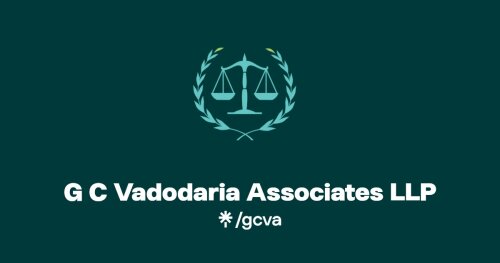Best Employment Benefits & Executive Compensation Lawyers in India
Share your needs with us, get contacted by law firms.
Free. Takes 2 min.
Or refine your search by selecting a city:
List of the best lawyers in India
About Employment Benefits & Executive Compensation Law in India
Employment Benefits & Executive Compensation law in India governs the various aspects related to the remuneration and incentives offered to employees and executives. This area of law includes statutory benefits such as gratuity, provident fund, pensions, and also encompasses bonuses, stock options, and other forms of executive compensation agreements. The legal landscape in India is influenced by multiple statutes such as the Employee Provident Fund Act, Payment of Gratuity Act, Payment of Bonus Act, among others. These laws ensure fair practices, compliance standards, and aim at protecting the interests of both employees and employers within corporate frameworks.
Why You May Need a Lawyer
There are several scenarios where legal expertise might be crucial in the field of Employment Benefits & Executive Compensation:
- Disputes over unpaid gratuity, provident funds, or pensions.
- Concerns regarding the structure and implementation of stock options and incentive plans.
- Contractual disagreements involving executive compensation packages.
- Compliance issues related to statutory obligations and corporate policy alignment.
- Designing compensation structures that are tax efficient and legally compliant.
- Given the complexity of the laws and potential for significant financial implications, having a lawyer can ensure informed decision-making and legal protection.
Local Laws Overview
In India, Employment Benefits & Executive Compensation are governed by several key laws, including:
- Employee Provident Fund and Miscellaneous Provisions Act, 1952: This mandates contributions by both the employer and employee towards a retirement savings fund.
- Payment of Bonus Act, 1965: This requires employers to pay bonuses to their employees based on the profitability of the organization.
- Payment of Gratuity Act, 1972: This law governs the payment of gratuity, applicable to employees who have completed a certain number of years of service.
- The Companies Act, 2013: Provides guidelines for directorial compensation and establishment of remuneration policies.
- Income Tax Act, 1961: Taxation provisions that affect how both employers and employees negotiate and implement compensation plans.
Frequently Asked Questions
What is considered under executive compensation in India?
Executive compensation typically includes base salary, performance bonuses, stock options, deferred payments, and other forms of financial remuneration or benefits.
Are stock options common in India and how are they regulated?
Stock options are an increasingly popular form of compensation for executives in India. They are regulated under the SEBI (Share Based Employee Benefits) Regulations, 2014.
What legal recourse do employees have if they do not receive their provident fund?
An employee can approach the EPFO or the appropriate legal authority if their employer has failed to deposit the provident fund as mandated.
How is an employee's bonus calculated in India?
Bonuses are calculated based on the provisions laid out in the Payment of Bonus Act, considering aspects like profitability of the company and the excess over minimum threshold salary.
What is the role of the gratuity in employment benefits?
Gratuity is a statutory benefit paid to employees who have rendered continuous service for at least five years, serving as a retirement benefit.
Is it mandatory for all employers to provide pension benefits?
Pension benefits are part of the EPF scheme. All organizations with more than 20 employees are required to offer this benefit.
What are the penalties for non-compliance with employment benefits laws?
Penalties for non-compliance can include fines, penalties, and legal suits against the employer, which can lead to financial and reputational damage.
How are fringe benefits taxed in India?
Fringe Benefits Tax was abolished in India in 2009, but related benefits are considered part of salary and taxed under the Income Tax Act.
Can compensation be renegotiated at the start of a new financial year?
Compensation can be renegotiated based on the employment contract stipulations, mutual agreement between the employer and employee, and company policy.
How are disputes related to executive severance packages resolved?
Such disputes can be resolved through negotiation, mediation, or legal intervention, depending on the terms of the employment contract and the situation at hand.
Additional Resources
Several resources can aid understanding and compliance in the field of Employment Benefits & Executive Compensation:
- Employee Provident Fund Organisation (EPFO): Manages and provides guidance on provident fund, pension schemes, and other statutory benefits.
- Ministry of Labour & Employment, Government of India: Provides policies, acts, and updates on labor laws and employment benefits.
- National Pension System (NPS): Initiative by PFRDA to facilitate retirement planning and pension scheme management.
Next Steps
If you need legal assistance in Employment Benefits & Executive Compensation:
- Identify your specific legal concerns and document all relevant information.
- Consult with a lawyer specializing in employment law to assess your situation and provide advice tailored to your needs.
- Prepare all necessary documents and evidence that may be required in legal proceedings or negotiations.
- Consider mediation or negotiation for resolving disputes before proceeding to litigation.
By taking these steps, you ensure that your rights are protected and that any legal proceedings are grounded in a thorough understanding of the relevant laws and regulations.
Lawzana helps you find the best lawyers and law firms in India through a curated and pre-screened list of qualified legal professionals. Our platform offers rankings and detailed profiles of attorneys and law firms, allowing you to compare based on practice areas, including Employment Benefits & Executive Compensation, experience, and client feedback.
Each profile includes a description of the firm's areas of practice, client reviews, team members and partners, year of establishment, spoken languages, office locations, contact information, social media presence, and any published articles or resources. Most firms on our platform speak English and are experienced in both local and international legal matters.
Get a quote from top-rated law firms in India — quickly, securely, and without unnecessary hassle.
Disclaimer:
The information provided on this page is for general informational purposes only and does not constitute legal advice. While we strive to ensure the accuracy and relevance of the content, legal information may change over time, and interpretations of the law can vary. You should always consult with a qualified legal professional for advice specific to your situation.
We disclaim all liability for actions taken or not taken based on the content of this page. If you believe any information is incorrect or outdated, please contact us, and we will review and update it where appropriate.
Browse employment benefits & executive compensation law firms by city in India
Refine your search by selecting a city.

















